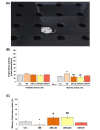Restoring Brain Pathways Involved in Diabetes-Associated Neurocognitive Disorders: The Potential of Dipeptidyl Peptidase 4 Inhibitors as a Therapeutic Strategy
- PMID: 38860903
- PMCID: PMC12105248
- DOI: 10.2174/1570159X22666240517094428
Restoring Brain Pathways Involved in Diabetes-Associated Neurocognitive Disorders: The Potential of Dipeptidyl Peptidase 4 Inhibitors as a Therapeutic Strategy
Abstract
Background: Diabetes, a widespread chronic metabolic disease, is projected to affect 783 million people globally by 2045. Recent studies emphasize the neuroprotective potential of dipeptidyl peptidase 4 (DPP4i) inhibitors, pointing toward a promising avenue for intervention in addressing cognitive challenges associated with diabetes. Due to limited data on the effect of DPP4i on brain pathways involvedin diabetes-related neurocognitive disorders, the decision was made to conduct this study to fill existing knowledge gaps on this topic.
Methods: The primary aim of our study was to evaluate the potential of DPP4 inhibitors (DPP4i) in preventing cognitive decline in mice with type 2 diabetes (T2D), placing special emphasis on gaining insight into the complex molecular mechanisms underlying this action.
Results: We examined drug efficacy in modulating neurotrophic factors, calcium levels, and the expression of key genes (HIF1α, APP, Arc) crucial for neural plasticity. Conducting cognitive assessments with the hole board and passive avoidance tests, we discerned a remarkable influence of shortterm gliptin usage on the limiting progress of cognitive dysfunction in diabetic mice. The administration of DPP4 inhibitors ledto heightened neurotrophin levels, increased HIF1α in the prefrontal cortex, and a significant elevation in Arc mRNA levels.
Conclusion: Our findings reveal that DPP4 inhibitors effectively limit the progression of diabetesrelated cognitive disorders. This breakthrough discovery not only opens new research avenues but also constitutes a potential starting point for creating innovative strategies for the treatment of central nervous system disorders focused on improving cognitive abilities.
Keywords: APP; Arc.; Dipeptidyl peptidase 4 inhibitors; HIF1α; diabetes; neurotrophins.
Copyright© Bentham Science Publishers; For any queries, please email at epub@benthamscience.net.
Conflict of interest statement
The authors declare no conflict of interest, financial or otherwise.
Figures




Similar articles
-
Neuroprotective roles of SGLT2 and DPP4 inhibitors: Modulating ketone metabolism and suppressing NLRP3 inflammasome in T2D induced Alzheimer's disease.Exp Neurol. 2025 Aug;390:115271. doi: 10.1016/j.expneurol.2025.115271. Epub 2025 Apr 26. Exp Neurol. 2025. PMID: 40294740
-
Biological function of dipeptidyl peptidase-4 on type 2 diabetes patients and diabetic mice.Curr Res Transl Med. 2019 Aug;67(3):89-92. doi: 10.1016/j.retram.2018.12.002. Epub 2018 Dec 24. Curr Res Transl Med. 2019. PMID: 30591375
-
SGLT2 and DPP4 inhibitors improve Alzheimer's disease-like pathology and cognitive function through distinct mechanisms in a T2D-AD mouse model.Biomed Pharmacother. 2023 Dec;168:115755. doi: 10.1016/j.biopha.2023.115755. Epub 2023 Oct 21. Biomed Pharmacother. 2023. PMID: 37871560
-
Mechanisms of neurodegeration in type 2 diabetes and the neuroprotective potential of dipeptidyl peptidase 4 inhibitors.Curr Med Chem. 2015;22(13):1573-81. doi: 10.2174/0929867322666150227153308. Curr Med Chem. 2015. PMID: 25723507 Review.
-
Combination of sodium-glucose cotransporter 2 inhibitor and dipeptidyl peptidase-4 inhibitor in type 2 diabetes: a systematic review with meta-analysis.Sci Rep. 2018 Mar 13;8(1):4466. doi: 10.1038/s41598-018-22658-2. Sci Rep. 2018. PMID: 29535389 Free PMC article.
References
-
- UN. World Population Aging 2015. United Nations 2015, San Francisco, CA, USA. https://www.un.org/en/development/desa/population/publications/pdf/agein... (Accessed May 29,2023).
-
- Crimmins E.M., Kim J.K., Langa K.M., Weir D.R. Assessment of cognition using surveys and neuropsychological assessment: The health and retirement study and the aging, demographics, and memory study. J. Gerontol. B Psychol. Sci. Soc. Sci. 2011;66(Suppl 1):i162–i171. doi: 10.1093/geronb/gbr048. - DOI - PMC - PubMed
MeSH terms
Substances
Grants and funding
LinkOut - more resources
Full Text Sources
Medical
Miscellaneous

